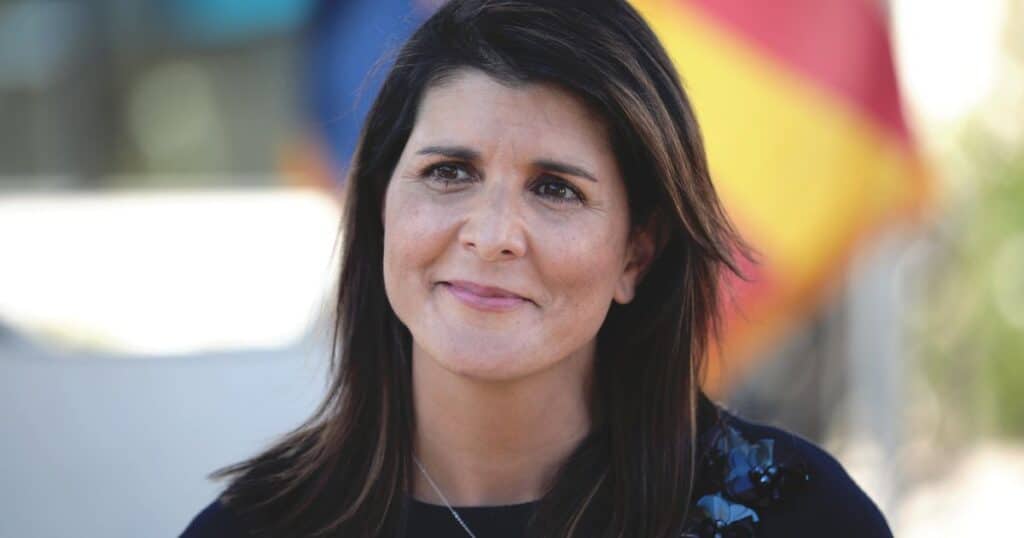Nikki Haley has had a noteworthy career in politics, with her journey in politics beginning at the state level, serving as a representative in the South Carolina House of Representatives from 2005 to 2011.
Known for her conservative ideology and dedication to limited government and lower taxes, she went on to make history by becoming the first female and first person of Indian descent to hold the office of Governor in South Carolina after winning the gubernatorial election in 2010.
Her tenure as governor was marked by a focus on economic development, job creation, and tax reform, as well as a significant policy impact on cannabis prohibition in her home state of South Carolina.
Haley’s national and international profile was elevated when she was appointed as the United States Ambassador to the United Nations by President-elect Donald Trump in 2016, a position she held from 2017 to 2018. Following her resignation from the UN Ambassador role in 2018, Nikki Haley has remained a significant voice in the Republican Party and has entered the race for the 2024 Presidential Election.
Haley has consistently maintained a strict stance against the federal legalization of cannabis, and instead opts to allow states to decide its legalization status. While this stance on states rights differs from other candidates like Asa Hutchinson and Chris Christie, she has not made it clear whether or not these words will be reflected in her policy. From Haley’s involvement in the Trump administration to the legalization of industrial hemp in South Carolina, there is a complex image to be painted of her stance on legalization.
Cannabis Policy During Haley’s Tenure as South Carolina Governor
As the Governor of South Carolina from 2011 to 2017, Haley played a significant role in shaping the state’s approach to cannabis. While she maintained a staunch anti-cannabis stance, there were notable exceptions.

In 2014, Haley signed legislation legalizing industrial hemp in the state, recognizing its potential benefits without the psychoactive properties associated with cannabis. She also authorized the use of cannabidiol (CBD) oil, a non-psychoactive component of cannabis, for patients suffering from severe epilepsy when conventional treatments proved ineffective.
Federal Policy Alignment
During her time as U.S. Ambassador to the United Nations in the Trump administration, Haley was associated with an administration that made a historic change in federal cannabis policy. The Trump administration took a more stringent stance on cannabis, leading to the rescission of the 2013 Cole Memorandum, an Obama-era policy that had provided some protection to states with legalized cannabis.
This change in policy meant that states were left without federal safeguards, and cannabis businesses faced greater uncertainty. Another noteworthy policy change was the implementation of the Farm Bill, which was responsible for legalizing and defining industrial “hemp”. This bill had a complex impact on the legal market, and led to the growth of hemp derived CBD products and THC alternatives.
The Evolving Cannabis Landscape
The cannabis landscape in the United States has been rapidly evolving, with an increasing number of states legalizing both medical and recreational cannabis. Public opinion has shifted in favor of cannabis reform, and the challenges of maintaining a strict anti-cannabis stance have become more apparent.
Haley’s views on cannabis have been briefly mentioned since she has entered the race for the 2024 election, but her policy impact is limited and she has not made many public statements. With the election approaching and the growing concern over cannabis prohibition, it is likely we will see more on Haley’s stance in the coming months.
An Overview:
Nikki Haley’s long-standing opposition to cannabis legalization, with some exceptions, is complex and doesn’t point directly towards prohibition or legalization. Her policy impact on cannabis during her time as the Governor of South Carolina reflected a determination to stray away from legalization, but showed sympathy towards the medical uses of cannabis.
Additionally, she was apart of the Trump Administration when they rescinded the 2013 Cole Memorandum. Haley may not have a clear stance on cannabis prohibition, but it is clear that she intends to run in the election as an advocate of states rights with her recent statements.
Feature Image courtesy of Gage Skidmore Flickr
About the Author

Michael has a background in cannabis education and grew up in a family with roots in the industry. When he was Director of Events at Cannaclub UCLA he had the chance to learn from the industry and educate the student body on various aspects of the industry and the plant’s medical benefits.
Enjoyed that first hit? Come chill with us every week at the Friday Sesh for a freshly packed bowl of the week’s best cannabis news!
















